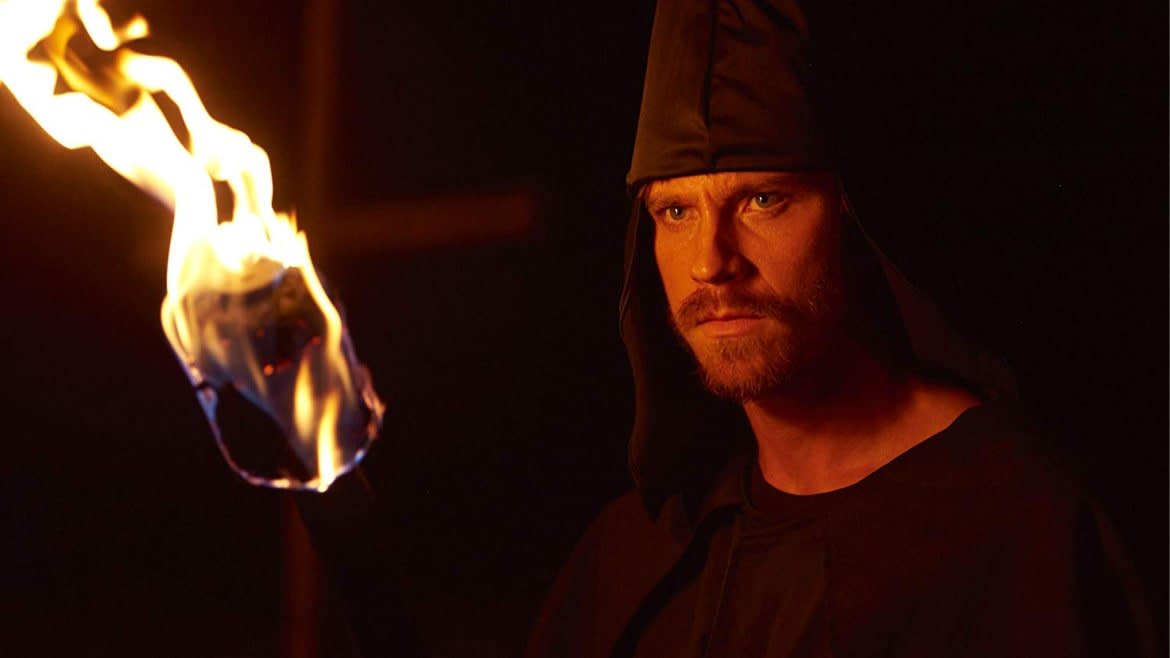‘Burden’ Is a Truly Appalling White-Supremacist Redemption Movie

Burden, in theaters Feb. 28, is your latest white supremacist redemption film, and like many others in the canon, I’m sorry I ever had to see it.
Writer/director Andrew Heckler read about the true story his film is based on in a newspaper in 1997, the year after the KKK in Laurens, South Carolina, opened up a Klan museum in its old Echo Theatre. The museum wasn’t a historical resource but a racist curiosity, where Klansmen and women in their day clothes sold white supremacist paraphernalia and celebrated the Klan, with a Confederate flag flying high outside the museum. Heckler went to South Carolina to spend time with the local community—from black residents fighting the museum to, I’m assuming, white racists who supported it—and ended up writing the screenplay for Burden, which focuses on racial reconciliation and the notion that we must fight the Klan with love. But in the world of the film, love means barely skeptical enabling.
The most exasperating aspect of Burden, which is more dull and incompetent than it is offensive, is that it manages to let white communities as well as the institutions that actually had structural power in 1990s Laurens entirely off the hook for rehabilitating and bringing to justice the Ku Klux Klan members they allow to live amongst them. Instead, a black reverend, played by an excessively earnest Forest Whitaker, and his congregation must do all the work to protect former Klansman Mike Burden—played by an overcommitted and undirected Garrett Hedlund—from his bloodthirsty ex-buddies, welcoming him into their fold after he beats a black teenager with a bat.
‘Alt-Right’ Ringleader Richard Spencer: We Attract the Mentally Ill
Chris Evans, AKA Captain America, Hits Back at White Nationalist David Duke’s Racist Trolling
The film asks us to believe that the one white person doing the work is Mike’s new girlfriend, Judy, a single mother played by the usually great Andrea Riseborough, who struggles here to make much out of her clichéd role. But Heckler doesn’t see that Judy, as he’s written her, is part of the problem—she entrusts Mike with her young son’s black best friend as a way of reforming him, teasing her Klansman boyfriend about the fact that he would have touched the little boy on their fishing trip, and must feel dirty, according to his beliefs. (I’m not a lovestruck white woman from the Deep South, but I couldn’t imagine taking such a risk with someone’s else’s child just to school my brainwashed boyfriend—at least not without holding onto some kind of twisted contempt or unchecked stupidity myself.)
Judy’s “grandaddy was Klan” and so she gets it, apparently, but openly rejects those beliefs. She also has a token black friend in Usher’s Clarence Brooks, who was also a childhood friend of Mike Burden (Clarence is, of course, the father of the black child Judy uses to try to enlighten Mike). Despite these facts, Judy is willing to let Mike move in with her and her son, at least until she’s ready to serve him with an ultimatum: It’s the Klan, or me.
Well, Mike doesn’t listen at first. And why would he, when Judy is willing to fall for an avowed white supremacist, and let him babysit? In fact, Mike doesn’t begin to reform himself after the ultimatum, but turns his hateful beliefs into rage-fueled violence. He does so not only out of a conviction for white supremacy, but, as the film tells it, to please his surrogate father, Tom Griffin, played by a lost-looking Tom Wilkinson taking his best English swing at dead-eyed KKK ringleader. According to the film, white supremacy is about lost white boys seeking love in the form of daddies—the ritualized racist hatred and violence is just part of the deal.
Bad people, so to speak, can change, and often need the support of communities to be successful in that change. But like many films that tackle this subject, Burden isn’t interested in the histories of white supremacy and antiracism—instead, it gets off on the idea of black forgiveness.
Heckler finds Mike Burden’s salvation in the fact that, in 1996, there was a black church willing to dedicate significant material and emotional resources to the personal safety and moral absolution of a violent Klansman. In the film, it takes a long time to see Mike take any sincere interest in reforming himself, and his initial aim in defecting from the Klan seems to be to lead a normal life with his nice girlfriend, away from the thuggishness of it all. This depiction of Mike’s ambivalence about the Klan would’ve been fine if the film had anything intelligent to say about it. Instead, the end of the film makes grotesque last-ditch attempts at filling in the gaps of his coming to Jesus. Religiousness has a strong legacy within the history of antiracism and antifascism, and Heckler might have looked into this history to figure out how to make sense of Mike’s story, including his reasons for finally leaving the KKK and turning himself into police. But the director allows his folksy sympathy for Mike to overtake the story, and is never truly able to look at him or the community that raised him.
Still, the facile nature of the white supremacist redemption narrative comes as no surprise: There’s one fewer Klansman in the world to discomfort polite society and yet another empty movie that relies on black spirituality to enact racial reconciliation—a convenient bedtime story for those who would like racial justice to remain orderly.
Got a tip? Send it to The Daily Beast here
Get our top stories in your inbox every day. Sign up now!
Daily Beast Membership: Beast Inside goes deeper on the stories that matter to you. Learn more.

 Yahoo News
Yahoo News 
